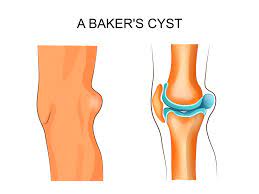A Baker's cyst, also known as a popliteal cyst, is a fluid-filled sac that forms behind the knee. It occurs when fluid from the joint accumulates in the bursa, a small sac that cushions the joint. The excessive fluid causes the bursa to swell and bulge outward, resulting in a Baker's cyst. Though they are generally harmless, Baker's cysts can cause pain and discomfort.
What Causes Baker's Cysts?
Baker's cysts are most commonly caused by arthritis, specifically osteoarthritis or rheumatoid arthritis. Arthritis results in the deterioration of the cartilage that cushions the bones in joints. This deterioration causes the bones to rub against each other, which leads to inflammation. The body responds to this inflammation by producing excess fluid, which accumulates in the bursa and eventually forms a Baker's cyst.
Other possible causes of Baker's cysts include: gout, infection, trauma, or tumors.
The most common symptom of a Baker's cyst is a dull ache behind the knee that gets worse with activity. As the cyst grows larger, it may cause pain when bending or extending the knee. In some cases, Baker's cysts can rupture and leak fluid into the calf muscle, causing severe pain and swelling. Ruptured cysts require immediate medical attention.

In rare cases, Baker's cysts can compress nerves or blood vessels near the knee, causing numbness or tingling in the leg. If you experience any of these symptoms, seek medical help immediately as they could be indicative of a more serious underlying condition such as cancer or deep vein thrombosis (DVT).
Treatment for Baker's cysts generally depends on the underlying condition causing them. If arthritis is to blame, treating the arthritis can often alleviate symptoms and shrink the size of the cyst. Non-steroidal anti-inflammatory drugs (NSAIDs) such as ibuprofen can help reduce pain and inflammation. If these conservative measures don't provide relief, your doctor may recommend steroid injections or surgery to remove the cyst. We have also found many customers use our Crosstrap on top of the Cyst to reduce the pain and irritation throughout the day. This is not a permanent solution but will give you relief when you need it.

It's important to see your doctor if you think you have a Baker's cyst so that they can rule out any serious underlying conditions and develop an appropriate treatment plan for you.

